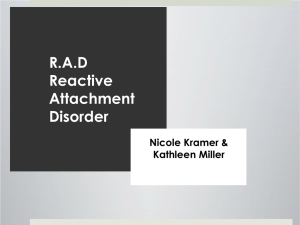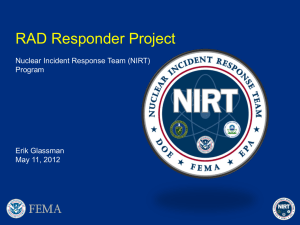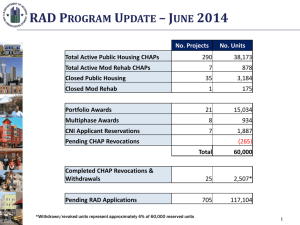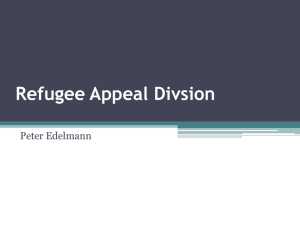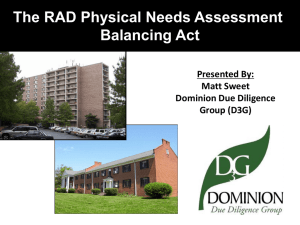paper - refugeelawyers.net
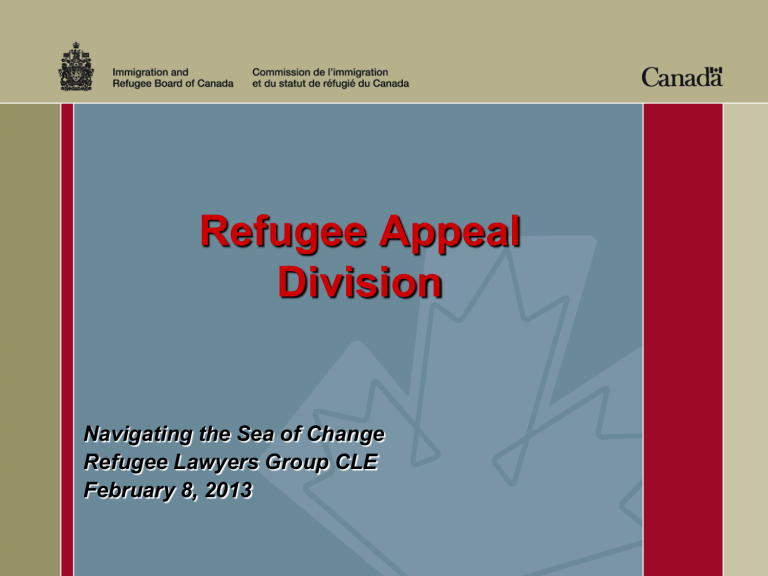
Refugee Appeal
Division
Navigating the Sea of Change
Refugee Lawyers Group CLE
February 8, 2013
Presentation Objective
Describe the appeal process at the Refugee Appeal
Division (RAD), with reference to:
Immigration and Refugee Protection Act (IRPA), as amended by
Balanced Refugee Reform Act (BRRA) , and
Protecting Canada’s Immigration System Act
( PCISA )
Immigration and Refugee Protection Regulations
(IRPR), registered November 30, 2012
Refugee Appeal Division Rules
(RAD Rules), registered November 30, 2012
Appeal to the RAD – Appellants
IRPA, s. 110(1)
Appeal to the RAD may be made:
by the person who is the subject of the
Refugee Protection Division (RPD) proceedings, or
by the Minister
Against a decision of the RPD to allow or reject the person’s claim for refugee protection
3
Appeal to the RAD – Grounds
IRPA, s. 110(1)
Person or the Minister may appeal to RAD on a
question of law
question of fact , or
question of mixed law and fact
4
No Appeal to the RAD
IRPA, s. 110(2)
No appeal to the RAD in respect of an RPD decision regarding:
designated foreign national (DFN) ( IRPA , s. 20.1)
withdrawn or abandoned claim
no credible basis or manifestly unfounded claim
exception to the Safe Third Country Agreement
designated country of origin (DCO) ( IRPA , s. 109.1)
5
No Appeal to the RAD ( cont’d)
IRPA, s. 110(2)
No appeal to the RAD in respect of an RPD decision regarding:
Minister’s application that refugee protection has ceased
(whether allowed or rejected)
Minister’s application to vacate refugee protection
(whether allowed or rejected)
claim described in Transitional Provisions
( BRRA , ss. 36(1) and 37)
6
No Appeal to the RAD ( cont’d)
IRPA, s. 110(2)
No appeal to the RAD in respect of an RPD decision regarding:
deemed rejection of claim because of Extradition Act
(IRPA , s. 105(4))
application for protection, i.e., Pre-Removal Risk
Assessment (PRRA) ( IRPA , s. 112(1))
7
RAD Proceedings
IRPA, s. 110(3)
RAD must proceed without a hearing ,
on the basis of the record of the RPD proceedings,
except that the RAD may, in accordance with certain provisions of IRPA ,
– accept documentary evidence and written submissions, and
– conduct an oral hearing
8
RAD Proceedings – New Evidence – Person
IRPA, ss. 110(3), (4), (5)
RAD may accept documentary evidence and written submissions from the person who is the subject of the appeal
the person may present only evidence
– that arose after the rejection of their claim, or
– that was not reasonably available, or
– that the person could not reasonably have been expected in the circumstances to have presented, at the time of the rejection
however, that restriction does not apply in respect of evidence presented in response to evidence presented by the Minister 9
RAD Proceedings – New Evidence – Minister
IRPA, ss. 110(3), 171(a.5)
RAD may accept documentary evidence and written submissions from the Minister
the Minister may, at any time before the RAD makes a decision , submit documentary evidence and make written submissions in support of the
Minister’s appeal or intervention in the appeal
( IRPA , s. 171( a.5
))
10
Oral Hearing
IRPA, s. 110(6)
RAD may hold a hearing if, in its opinion, there is documentary evidence referred to in subsection 110(3)
(i.e., “new evidence”)
( a ) that raises a serious issue with respect to the credibility of the person who is the subject of the appeal;
( b ) that is central to the decision with respect to the refugee protection claim; and
( c ) that, if accepted, would justify allowing or rejecting the refugee protection claim.
11
Composition of Panel
IRPA, s. 163
Matters before a Division shall be conducted before a single member unless the Chairperson is of the opinion that a panel of three members should be constituted
For three-member panels :
possible participation of UNHCR and other interested persons (interveners) ( IRPA , s. 110(3))
decisions are precedential ( IRPA , s. 171( c ))
12
RAD Decisions
IRPA, s. 111(1)
After considering the appeal, the RAD shall make one of the following decisions:
( a ) confirm the determination of the RPD;
( b ) set aside the determination and substitute a determination that, in its opinion, should have been made; or
( c ) refer the matter to the RPD for redetermination, giving the directions to the RPD that it considers appropriate.
13
RAD Decisions (cont’d)
IRPA, s. 111(2)
RAD may make the referral to the RPD under IRPA , s. 111(1)( c ), only if it is of the opinion that
( a ) the decision of the RPD is wrong in law, in fact or in mixed law and fact ; and
( b ) it cannot make a decision without hearing evidence that was presented to the RPD.
14
Key RAD Time Limits – Filing and Perfecting
IRPR, ss. 159.91(1), (2)
15 days from receipt of written reasons for the RPD decision to file the appeal
30 days from receipt of written reasons for the RPD decision to perfect the appeal
If the appeal cannot be filed and perfected within those time limits, the RAD may, for reasons of fairness and natural justice, extend that time limit by the number of working days that is necessary in the circumstances
Key RAD Time Limits – RAD Decision
IRPR, ss. 159.92(1), (2)
Time limit for the RAD to make a decision on an appeal is 90 days after the day on which the appeal is perfected, except when a hearing is held
If it is not possible for the RAD to make a decision on an appeal within 90 days ,
the decision must be made as soon as feasible after that time limit
Structure of the RAD Rules
Part 1 Rules applicable to appeals made by the person who is the subject of the appeal
Part 2 Rules applicable to appeals made by the Minister
Part 3 Rules applicable to all appeals
Part 4 Rules applicable to oral hearings
Part 1: Appeals Made by the Person
RAD Rules 2 – 7
Rule 2(1) – to file the appeal, the person must provide the
RAD with three copies of a written Notice of Appeal
Rule 2(2) – RAD gives a copy to Minister
Rule 2(3) – content of Notice of Appeal:
contact information (appellant; counsel; designated representative)
language of appeal (English / French)
CIC identification number / RPD file number
Rule 2(4): time limit to file set out in IRPR, s. 159.91
(15 days from receipt of written reasons for RPD decision)
Part 1: Appeals Made by the Person
RAD Rules 2 – 7
Rule 3(1) – to perfect the appeal, the person must provide the RAD with two copies of the Appellant’s Record
Rule 3(2) – RAD gives copy to Minister
Rule 3(3) – content of Appellant’s Record:
RPD notice of decision and written reasons
all or part of transcript relied on
any documents refused by RPD
any documentary evidence relied on
law, case law or other legal authority
Part 1: Appeals Made by the Person
RAD Rules 2 – 7
Rule 3(3) – content of Appellant’s Record (cont’d):
written statement indicating
• whether appellant is relying on new evidence
( IRPA , s. 110(4))
• whether appellant is requesting an oral hearing
( IRPA , s. 110(6)) and if they are making an application for change of location (Rule 66)
• language and dialect to be interpreted at a hearing, if necessary
Part 1: Appeals Made by the Person
RAD Rules 2 – 7
Rule 3(3) – content of Appellant’s Record (cont’d):
Memorandum with detailed submissions regarding
• errors that are grounds of the appeal
• where the errors are located in the RPD reasons, transcript, or audio recording
• how evidence is “new” and relates to the appellant
• the decision the appellant wants the RAD to make
• why RAD should hold a hearing
Part 1: Appeals Made by the Person
RAD Rules 2 – 7
Rule 3(4) – Memorandum must be not more than 30 pages, if single-sided; 15 pages, if double-sided
Rule 3(5): time limit to perfect set out in IRPR, s. 159.91
(30 days from receipt of written reasons for RPD decision)
Part 1: Appeals Made by the Person
RAD Rules 2 – 7
Minister may intervene at any time before the RAD makes a decision ( IRPA , s. 171( a.4
))
Rule 4(1) – Intervention by the Minister
Minister intervenes by filing:
written Notice of Intervention together with any documentary evidence that the Minister wants to rely on (mandatory)
Rule 4(3) – Intervention Record
(optional because of IRPA , ss. 171( a.5
))
Part 1: Appeals Made by the Person
RAD Rules 2 – 7
Rule 5 – the person replies to the Minister’s intervention by filing a Reply Record
Reply Record must be received by the RAD no later than 15 days after the appellant received
• the Minister’s Notice of Intervention,
• the Minister’s Intervention Record, or
• any additional documents provided by the Minister, as the case may be
Part 1: Appeals Made by the Person
RAD Rules 2 – 7
Rule 6(1) – Application for extension of time to file or to perfect
in accordance with Rule 37 (general applications rule)
grounds set out in IRPR, s. 159.91(2):
• fairness and natural justice
Rule 6(4) – application for extension of time to file must be accompanied by three copies of Notice of Appeal
Rule 6(5) – application for extension of time to perfect must be accompanied by two copies of Appellant’s
Record
Part 1: Appeals Made by the Person
RAD Rules 2 – 7
Rules 6(6) and (7) – Application for extension of time to reply to Minister’s Intervention
in accordance with Rule 37
in deciding the application, the RAD must consider all relevant factors, including:
whether application made in a timely manner and justification for any delay
whether there is an arguable case
prejudice to the Minister, if granted, and
nature and complexity of the appeal
Part 1: Appeals Made by the Person
RAD Rules 2 – 7
Rule 7 – Disposition of an Appeal
Unless a hearing is held, the RAD may, without further notice to the parties, decide an appeal on the basis of materials provided:
if 15 days have passed since Minister received the appellant’s record, or the time limit for perfecting the appeal has expired; or
if the reply record has been provided, or the time for providing it has expired
Part 2: Appeals Made by the Minister
RAD Rules 8 – 13
Rule 8 – Filing the appeal by the Minister
Rule 8(1): to file the appeal , the Minister must provide, first to the person, a written Notice of Appeal, and then to the RAD, two copies of the written notice of appeal
Rule 8(2) : content of notice of appeal
Rule 8(3): proof it was provided to the person
Rule 8(4): time limit set out in IRPR, s. 159.91 (15 days from the receipt of written reasons for RPD decision)
Part 2: Appeals Made by the Minister
RAD Rules 8 – 13
Rule 9 – Perfecting the appeal by the Minister
Rule 9(1): to perfect the appeal , the Minister must provide “any supporting documents”, first to the person and then to the RAD
Rule 9(2) : content of appellant’s record (optional)
Rule 9(3): length of memorandum
Rule 9(4): proof documents were provided to the person
Rule 9(5): time limit set out in IRPR, s. 159.91 (30 days from the receipt of written reasons for RPD decision)
Part 2: Appeals Made by the Minister
RAD Rules 8 – 13
Rule 10 – To respond, the person files:
written Notice of Intent to Respond together with the
Respondent’s Record
no later than 15 days after:
• the day the respondent receives “any supporting documents” from the Minister, or
• if an extension of time to perfect was allowed, the day on which the respondent is notified of the extension
Rule 11 – Reply by the Minister (Optional and at any time)
Part 2: Appeals Made by the Minister
RAD Rules 8 – 13
Rule 12(1) – Application by the Minister for extension of time to file or to perfect
in accordance with Rule 37
grounds set out in IRPR, s. 159.92(2)
fairness and natural justice
Rule 12(2) – Application for extension of time to file must be accompanied by two copies of a written Notice of Appeal
Rule 12(3) – Application for extension of time to perfect must be accompanied by any supporting documents, and an Appellant’s Record, if any
Part 2: Appeals Made by the Minister
RAD Rules 8 – 13
Rules 12(4), (5) – Application by Person for an extension of the time to respond
Rule 12(6) – Factors:
whether application made in a timely manner and justification for any delay
whether there is an arguable case
prejudice to the Minister, if granted, and
the nature and complexity of the appeal
Part 2: Appeals Made by the Minister
RAD Rules 8 – 13
Rule 13 – Disposition of an Appeal
Unless a hearing is held, the RAD may, without further notice to the parties, decide an appeal on the basis of materials provided:
if 15 days have passed since the Minister received the respondent’s record or the time limit for providing it has expired, or
if the Minister’s reply has been provided
Part 3: Rules Applicable to All Appeals
RAD Rules 14 – 54
Covers many topics such as:
Communication with the Division
Counsel
Language of the Appeal
Designated Representative
Specialized Knowledge
Notice of Constitutional Question
Documents
How to make an Application
Joining or Separating Appeals
Proceedings conducted in public, etc.
Part 3: Rules Applicable to All Appeals
RAD Rule 43
Assignment of Three-Member Panel
ordered by Chairperson ( IRPA , s. 163)
parties notified, as well as UNHCR, and the Minister even if the Minister has not yet intervened in the appeal
UNHCR is provided with RPD proceedings and RAD appeal documents and submissions
UNHCR may provide notice of intention to provide written submissions
Part 3: Rules Applicable to All Appeals
RAD Rule 46
Application by an “interested person” (intervener) to participate in an appeal conducted by a three-member panel includes:
explanation of why the applicant wants to participate
submissions, and explanation of how they are relevant
explanation of how their submissions differ from those of person and Minister and how it will help RAD decide the appeal
Part 3: Rules Applicable to All Appeals
RAD Rule 49
Application to Reopen an Appeal
may be made only if Federal Court has not made a final determination ( IRPA , s. 171.1)
must not be allowed unless there was a failure to observe a principle of natural justice
procedure where allegation of inadequate representation by counsel
Part 4: Rules Applicable to RAD Hearings
RAD Rules 55 – 68
Covers many topics such as:
fixing a date
notice to appear
conduct of a hearing
appellant in custody
interpreters
observers
additional documents
witnesses
application to change location of hearing
application to change date and time of hearing
abandonment
Part 4: Rules Applicable to RAD Hearings
RAD Rules 55 – 68
Rule 57 – Conduct of a Hearing
restricted to issues provided in notice to appear, unless RAD orders otherwise
unless the RAD orders otherwise, the standard order of questioning will be: (1) by appellant; (2) by any other party; (3) by appellant in reply; and (4) by RAD
limiting questioning of witnesses
oral representations, unless RAD orders otherwise
limits on representations

